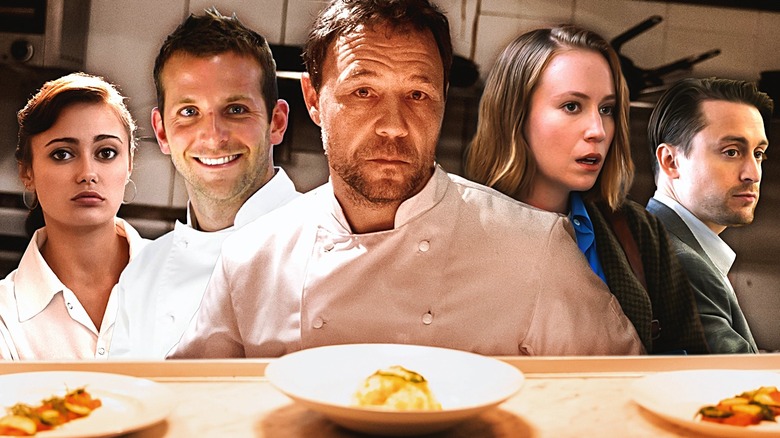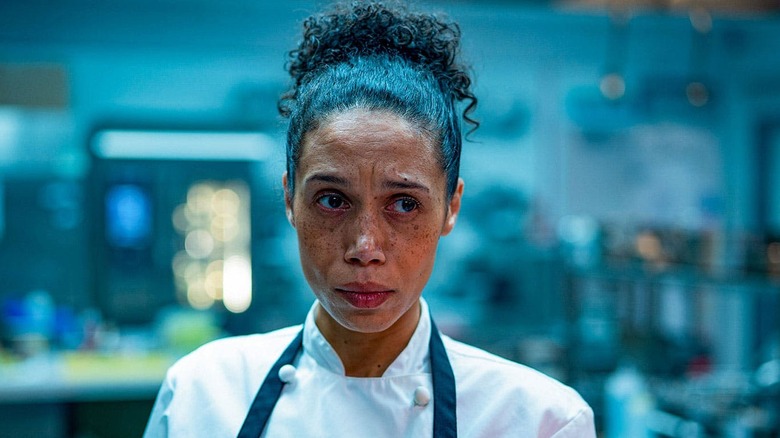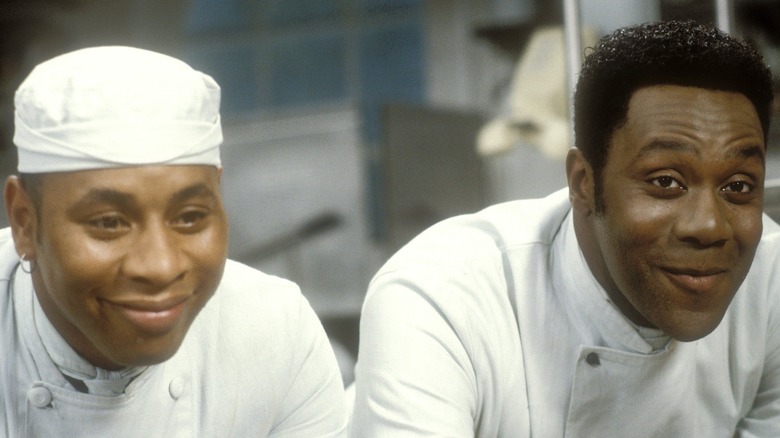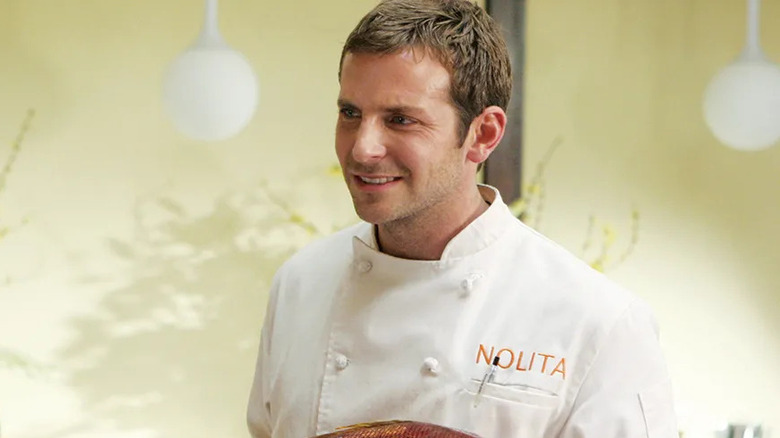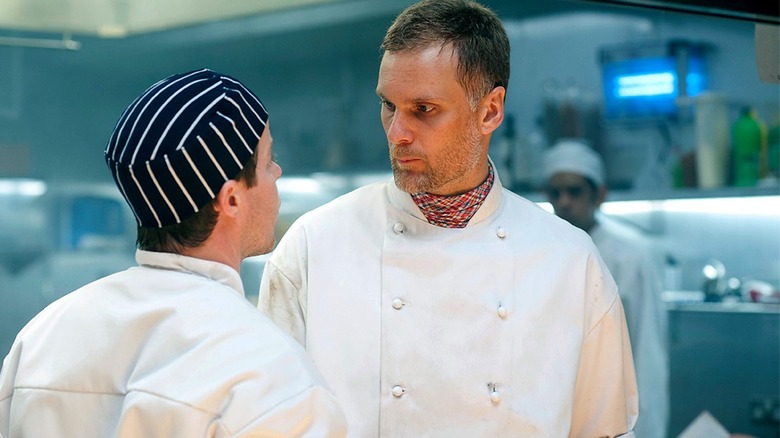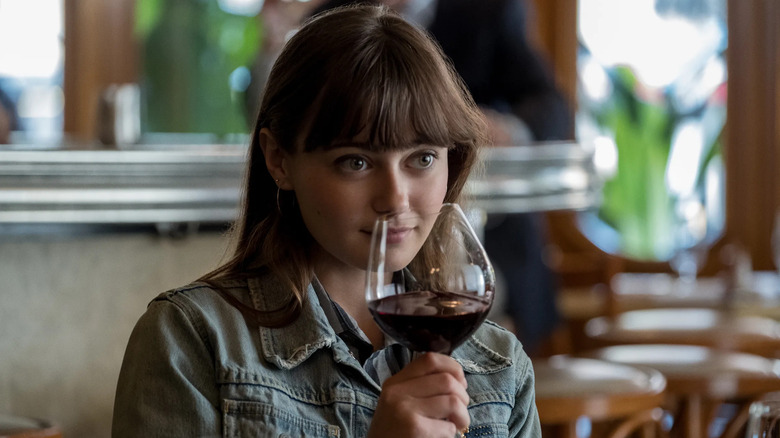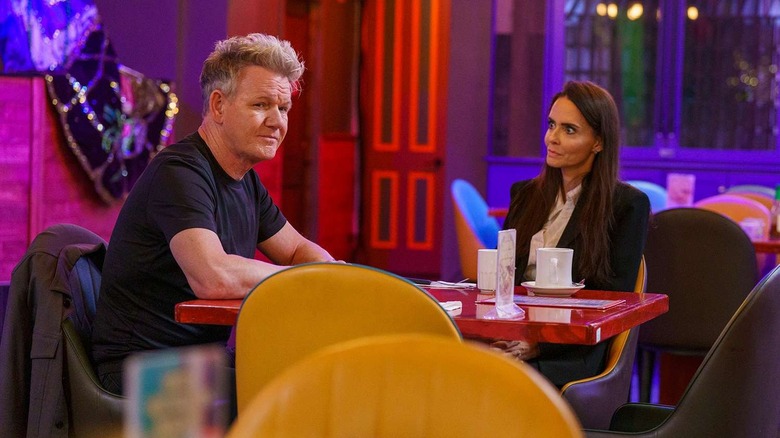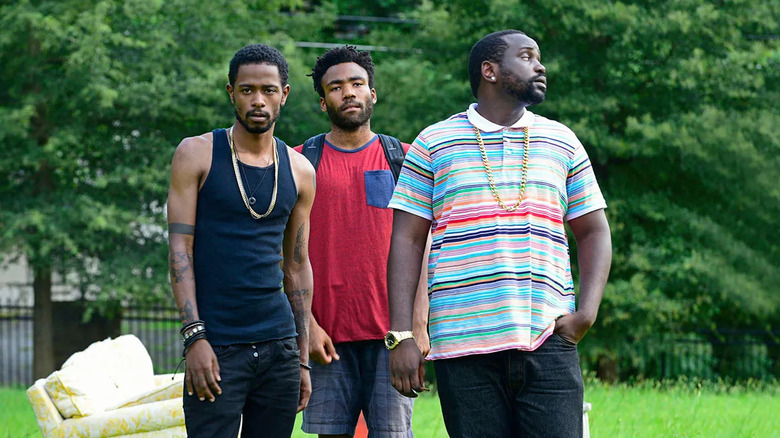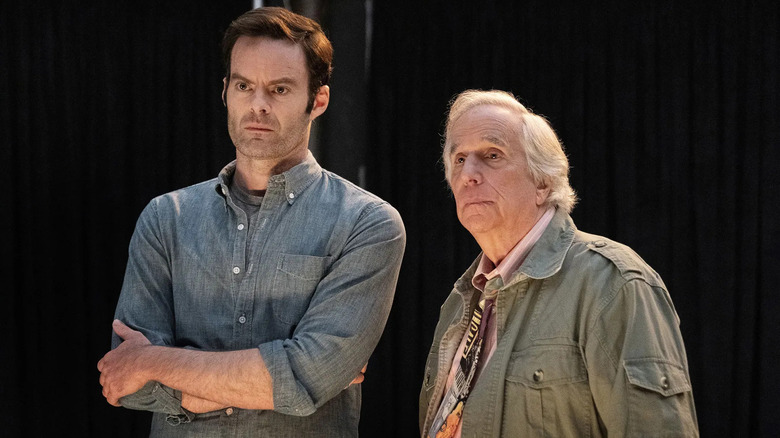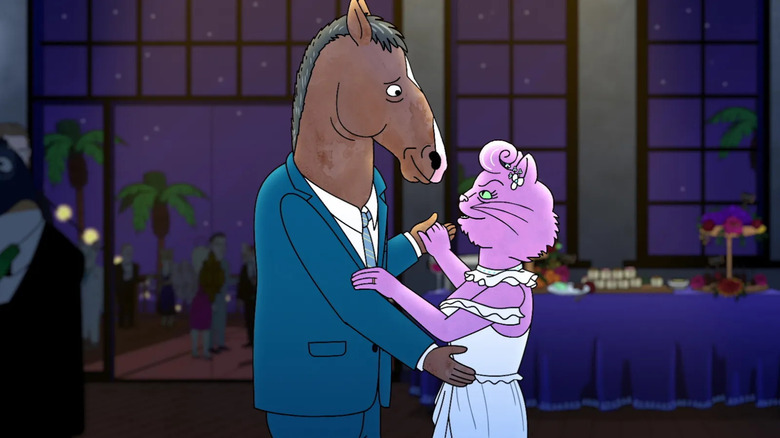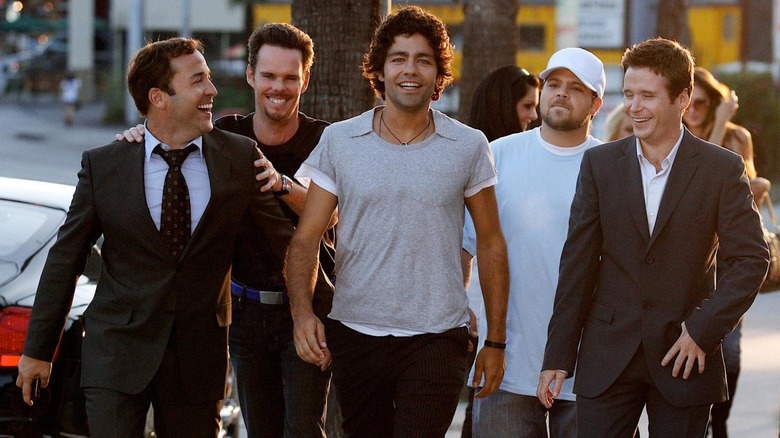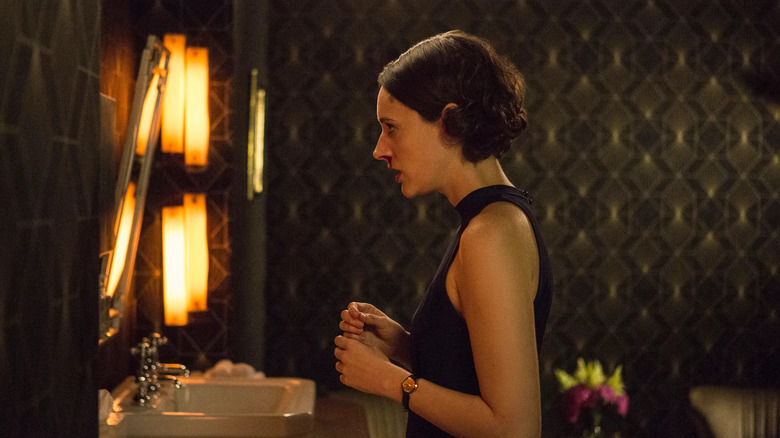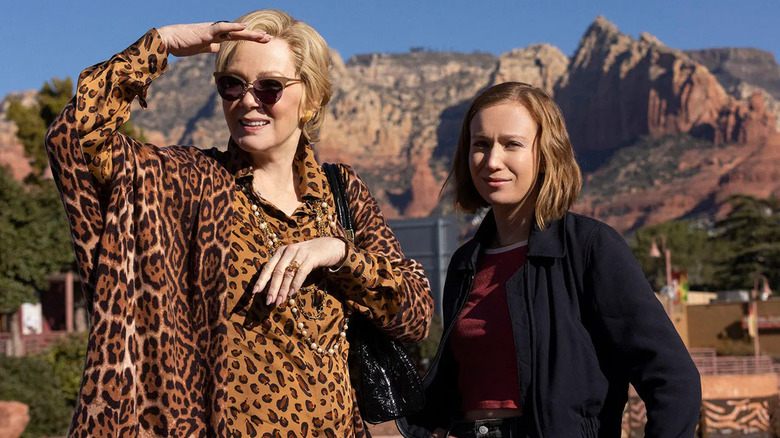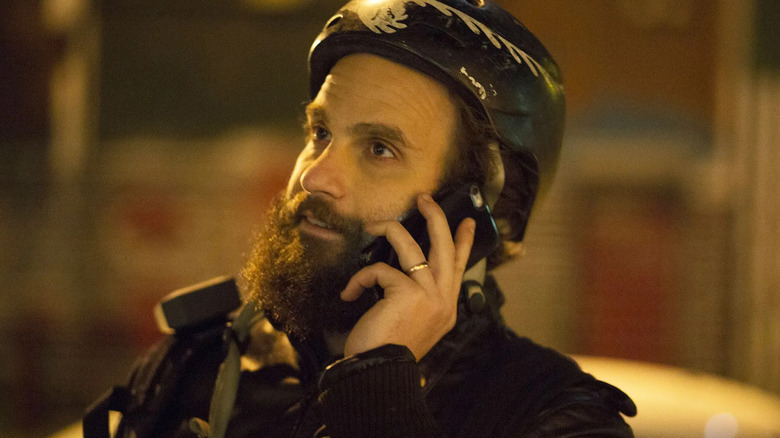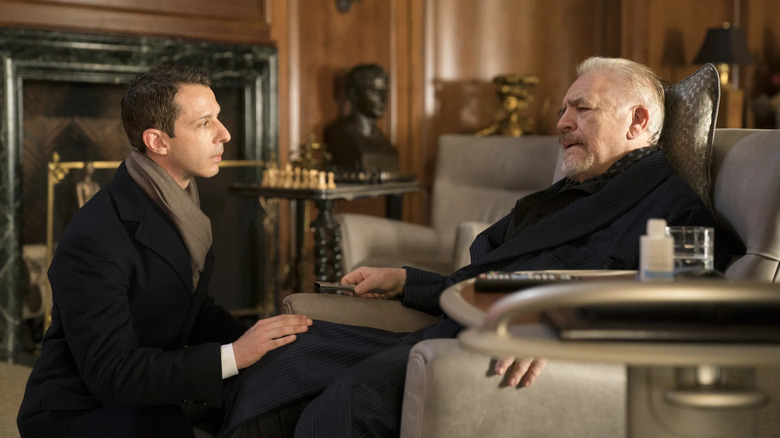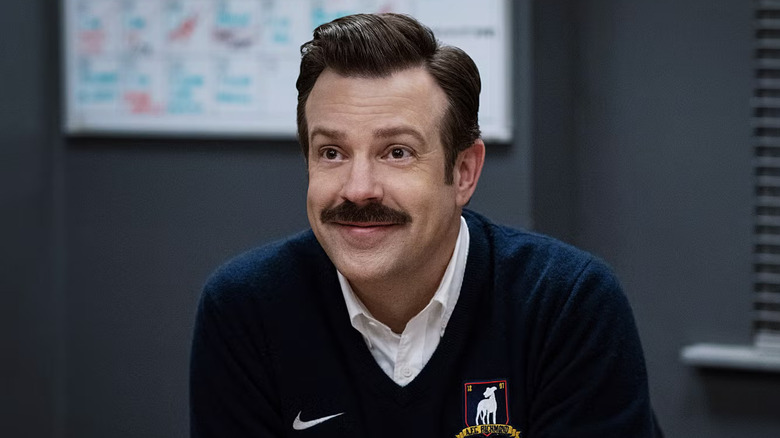15 Best TV Shows Like The Bear
We may receive a commission on purchases made from links.
After a polarizing 3rd season and a brief break, FX and Hulu's "The Bear" has finally returned for a fourth outing that feels almost like an apology to fans. As Carmen Berzatto (Jeremy Allen White) makes amends for all the emotional damage he's caused himself and others on his quest for culinary greatness, the show itself has made up for its own forgivable missteps by delivering an emotional feast of a season that refines its experimental elements into a stunning final product comparable to a fine dining experience.
Suffice it to say, season 4 of "The Bear" does more than whet one's appetite for TV shows of this kind — especially half-hour, episodic dramedies that manage to depict all the little complexities of life while keeping the dramatic ingredients fresh and surprising. In considering both series that follow those in the restaurant business and series that explore other industries, we've discovered the 15 best TV shows like "The Bear" that will satisfy your television cravings.
Boiling Point
Do you ever watch "The Bear" and think to yourself, "Yeah, this is good and all, but there's just not enough people shouting at each other in the kitchen"? ... No? Just us?
Well, if you're ever curious to see if you can take the heat of a show that somehow packs in more kitchen drama than "The Bear" (or, more likely, if you're a fan of both "The Bear" and the hit Netflix drama "Adolescence") then you should have a taste of the BBC's "Boiling Point." In the aftermath of her boss, Andy (Stephen Graham), suffering a career-ending mental breakdown and heart attack (as depicted in the 2021 film of the same name, for which this series serves as a soft sequel), former sous-chef Carly ("Sherlock" alum Vinette Robinson) tries to lead her own restaurant without succumbing to the same pressures. It's as close to "The Bear" in tone, style, and subject matter as any TV show you'll find.
Chef!
Now, for those of our readers who strangely don't always want a show to simulate a constant, simmering level of anxiety, the BBC has a less volatile option in "Chef!" Far from the realism of "The Bear," "Chef!" is a pure British sitcom filmed with multiple cameras, theatrical presentation, and a live and laughing studio audience.
Comedian Lenny Henry (currently starring in Amazon Prime Video's "The Rings of Power") stars as an eccentric professional chef who runs an English fine-dining restaurant in spite (or probably because) of his neurotic perfectionism, explosive temper, and inability to effectively communicate with his staff. Though these are the very traits that cause Carmen (and the audience) such pain on "The Bear," "Chef!" treats them as ingredients in a strictly comedic recipe, giving the audience the excitement of being on the other side of the kitchen door without all the stress.
Kitchen Confidential
Before Bradley Cooper threw on a chef's jacket for "Burnt" (as was curiously featured in season 3 of "The Bear"), the actor starred in a restaurant drama you've likely never heard of — Fox's short-lived "Kitchen Confidential." If the title rings a bell, it's likely because you've heard of the book written by the late chef and TV personality Anthony Bourdain, upon which "Kitchen Confidential" is loosely based.
Cooper plays Jack, a Bourdain-esque culinary underdog whose skills in the kitchen are undercut by bad luck, poor business partners, and personal failings. The tone of the series is generally lighter than "The Bear" (almost to a fault, as it seems to uncritically champion some of the more toxic elements of the restaurant industry that the latter series admirably challenges), walking the line between comedy, escapist thrills, and human drama that resembles HBO's "Entourage."
Whites
Speaking of "Entourage," it might surprise you to learn that it partially inspired the cooking-based comedy "Whites," another BBC series that would make a fine second course for readers still hungry after "The Bear." Ditching the multi-cam format and live studio audience of "Chef!" for a more understated, modern comedic style, "Whites" features the same trope of an over-the-top culinary artist struggling to lead a dysfunctional kitchen that fans of "The Bear" will find entertaining.
What sets it apart slightly from other entries on this list, however, is the exact characterization of protagonist Roland White (Alan Davies). Unlike Carmy, Jack from "Kitchen Confidential," and Carly from "Boiling Point," Roland is already in the twilight of his career, burnt out from the hustle and comfortable aimlessly amusing himself until he leaves the kitchen of the White House Hotel for good. What drama there is comes from the supporting cast of aspiring chefs and restaurateurs, whose ambitions conflict with Roland's humorous malaise.
Sweetbitter
From "Yellowjackets" to "Fallout," Ella Purnell has starred in some ridiculously popular television shows in recent years. In fact, the buzz of her career is so feverish that it's easy to lose track of her earlier work, including the Starz drama "Sweetbitter."
While "The Bear" and the rest of the series set in kitchens on this list focus on the genius chefs who run the show, "Sweetbitter" stars Purnell as a young waitress, whose unexpected descent into the restaurant world mere moments after arriving in New York City presents as many challenges, stressors, and dangers as it does potential meaning for her rudderless life. The series is relatable not only to anyone who has ever come to New York or worked in the industry as a relied-upon but oft-overlooked part of service, but also to those who, like Carmy, Richie, and much of The Bear's staff, find themselves lost in search of greater purpose.
Kitchen Nightmares
Before we open this list up to series outside the culinary world, we'd be remiss not to include at least one option from the king of kitchen TV himself, Gordon Ramsay. And while "Hell's Kitchen" or "MasterChef" will provide the thrills of professional competency, conflict, and craft that Ramsey has become known for, the uninitiated should absolutely introduce themselves to his work with "Kitchen Nightmares."
This reality TV series follows Ramsay as he travels the globe to meet with struggling restaurateurs who, in many cases, just can't get out of their own way. As he picks apart their business to find the root of their problems — whether it's a disastrous financial situation, a mismanaged kitchen, or an overstuffed and underwhelming menu — viewers will get to learn more about how restaurants of all sizes are run (or, more accurately, run directly into the ground).
Atlanta
As we transition away from shows about the restaurant business and the art of cooking, you'll notice a number of our choices focus on the entertainment industry. Both it and the culinary world, broadly speaking, share many of the same points of delicious dramatic tension — the need to balance artistic satisfaction and commercial success; the struggle to survive in a world that values beautiful, consumable products more than the people that make them; and the sheer euphoria of translating passion and vision into something tangible and extraordinary that turns a hustling artist into a revered legend.
No TV show explores these ideas in the same way as FX's "Atlanta," one of TV's defining half-hour dramedies that arguably paved the way for the success of "The Bear." Series creator and showrunner Donald Glover stars as Earn Marks, the quintessential burnt-out former-gifted kid whose flight to Princeton University only saw him return home with fewer job prospects and more responsibilities. Desperate to turn his life around, he inserts himself into the nascent rap career of his semi-estranged cousin Alfred "Paper Boi" Miles, pitching himself as the perfect business-oriented manager to counter Alfred's often chaotic lifestyle. Exceptionally experimental in its visual presentation, storytelling format, and dramatic tone, "Atlanta" is the rare series that gets better and weirder the more you watch it.
Barry
For readers who find "The Bear" compelling for its deconstruction of the relationship between professional success and personal self-worth, there's no better pairing than HBO's "Barry." More dark comedy than thrilling dramedy, "Barry" is another creator-led television masterpiece that throws Bill Hader into the equally dangerous worlds of international crime and a Los Angeles acting class.
His antihero Barry Berkman is a hilariously awkward hitman who serendipitously stumbles into the training studio of L.A. acting impresario Gene Cousineau (Henry Winkler). Though performing doesn't exactly come naturally to Barry, he has enough visible pain — and enough interest in his frequent scene partner Sally (Sarah Goldberg) — for Gene to take a somewhat special interest in him.
Where "Atlanta" gets stranger as it progresses, "Barry" gets progressively darker as the titular character's tragic fight for a second chance at life is constantly hampered by his past misdeeds. It's one of the funniest and most shocking TV shows HBO has ever produced, leading one to ponder the same questions of personal and professional purpose posed by "The Bear."
BoJack Horseman
Since Tony Soprano sat down in Dr. Melfi's office to open up about ducks, panic attacks, and "coffee," television has become increasingly comfortable with depicting characters actively struggling with their mental health. While this doesn't necessarily connect the seminal HBO hit to "The Bear" (though Tony and Uncle Jimmy might get along quite well), this kind of textured inner conflict as seen on the latter show does remind us of another horse-loving antihero — BoJack Horseman, the horse from "BoJack Horseman."
At first glance (and especially in its deceptive 1st season), "BoJack Horseman" will look like your run-of-the-track adult animated sitcom, with raunchy hit-or-miss humor, an unusual visual style, and an emotional simplicity aimed at making men in their 20s and 30s giggle as they scroll through YouTube Shorts. As the episodes progress, however, the series reveals itself as a serious character study of how aging television star BoJack (Will Arnett) copes with declining fame, unfulfilled dreams, a pathological need for attention, and the many relationships he destroys as he consistently and tragically favors fast professional validation over long-term emotional healing. The best episodes of "BoJack Horseman" are strange, goofy, and shocking all at once, delivering a truly singular TV experience that somehow creates profound drama out of a bunch of animals running around LA.
Entourage
Wait, hear us out! Nobody here at /Film is trying to argue that you'll get the same emotional experience watching "Entourage" as you will watching "The Bear" — nor are we broadly suggesting that the two shows are anywhere near each other in terms of character writing, psychological depth, or even contemporary sensibilities. That said, for readers who feel exhausted by the stress, anguish, and vivid conflict of "The Bear," but still need a moment to live in that kind of energy before moving on, "Entourage" is the perfect half-hour dramedy to watch next. And given how much it's already seasoned this list, it's only right we offer it as a garnish at least.
Loosely inspired by the life of executive producer Mark Wahlberg, "Entourage" follows the career of Vincent Chase (Adrian Grenier), a budding movie star fresh off of his first box-office hit. As he tries to split his focus between his professional passions and the fast-paced L.A. world of sex, drugs, and non-stop parties, he relies on the guidance of his ruthless and powerful agent Ari Gold (Jeremy Piven) and his childhood friend-turned-manager Eric Murphy (Kevin Connolly). "Entourage" has the same industry intrigue, hustle, and tension that "The Bear" has, but at a lower dose. And with how episodic it is, you can always take a break from it without feeling like you need to finish all eight seasons (and the 2015 "Entourage" sequel film).
Fleabag
Contrarily, if you are seeking even more emotional pain immediately after "The Bear," there's no sharper instrument than the acclaimed British series "Fleabag." Though the titular character (played by series creator Phoebe Waller-Bridge) could be considered a struggling restauranteur like Carmy, what they have most in common is a shared difficulty maintaining healthy relationships with their friends, family, and lovers.
For Fleabag, life is defined by emotional distance from others and a constant, almost narcissistic interrogation of herself — oh, and also a lot of maladaptive, meaningless sex with a lot of people she cares little for and/or actively dislikes. It can be an upsetting show to watch, with Waller-Bridge's character making mistake after mistake and burning through what little grace she is given by the equally messed-up people around her as she fights to be comfortable in her own head. But the surprisingly hilarious (like, laugh-out-loud funny) writing and compelling performances from Waller-Bridge, Sian Clifford, Olivia Colman, and Andrew Scott make "Fleabag" not only watchable but deeply cathartic.
Hacks
Currently wrapping up its fourth spectacular season as of writing, "Hacks" is the sort of show everyone says you should be watching, but for whatever reason never makes it to the top of your watch list. In fairness, the premise isn't immediately clear or distinct based on the slight marketing it gets, and there aren't really any big names in it apart from Jean Smart. But if you've been putting off giving "Hacks" a chance thus far, let this article be a sign — if the series beating "The Bear" for Outstanding Comedy Series at the 2024 Emmy Awards wasn't one already.
Smart is perfectly cast and given the runway for a career-best performance as the imposing Deborah Vance, a fading star of a bygone era of comedy struggling to maintain relevance as a stand-up with a weakening grip on her historic Las Vegas residency. Just as the owner of the casino threatens to pull the plug, she partners with Ava Daniels (Hannah Einbinder), a young would-be comedy wunderkind in the throes of online cancellation. Their relationship is the best part of "Hacks," giving the show unexpected depth and a genuine comedic backbone, even as it bravely invites the audience to consider what makes a joke funny in the first place. And its depiction of the lifestyle of a comedian is just as accurate as how "The Bear" depicts professional chefs – so much so that it gave Conan O'Brien PTSD.
High Maintenance
To paraphrase Roger Ebert, stories are machines that generate empathy. Though the legendary film critic was specifically talking about movies when he gave this famous quote, the same is absolutely true for "The Bear" and, perhaps to an even greater extent, "High Maintenance."
Beginning its life as an independently produced web series uploaded to the video-sharing site Vimeo, "High Maintenance" caught the attention of HBO executives for its off-beat sense of humor, episodic pacing, and unique premise. Co-creator Ben Sinclair plays "The Guy," an enigmatic wanderer who makes a living as a boutique bicycle courier in New York City — except instead of delivering newspapers or DoorDash orders, he delivers marijuana.
Because of the illicit nature of his business and the personal benefits it provides his clients, he has more of an opportunity than most delivery workers to develop special, and often unusual, relationships with everyone he meets. Each episode follows a new delivery, almost like a series of short films unified by a single protagonist. With such variance in its plot, tone, cast, and style, it's even more amazing that "High Maintenance" has a near-perfect score on Rotten Tomatoes.
Succession
The grit and grime of Carmy's kitchen grind might seem like a far cry from the world of media empires, luxury lifestyles, and cold capitalism seen on "Succession." But while the Roys of New York would have likely never had the taste to set foot in The Bear, they are united with the Berzattos by familial trauma.
If you've yet to experience HBO's modern masterpiece for yourself, "Succession" begins with heir-apparent Kendall Roy (Jeremy Strong) on the cusp of taking over the family media conglomerate from his emotionally distant father Logan (Brian Cox). As logical a successor as he may seem, it's immediately apparent that actually abdicating the throne and crowning Kendall "No. 1 Boy" is deeply uncomfortable both for Logan himself and the rest of Kendall's siblings: Connor (Alan Ruck), the neglected eldest child from a previous marriage; Roman (Kieran Culkin), the youngest and least responsible of the brood; and Siobhan (Sarah Snook), a political consultant tired of being on the outside looking in. Each of them has a worthy claim to the Roy family legacy — and each of these "Succession" characters is capable of absolute evil.
As they fight and flail for power, affection, and attention from Daddy, "Succession" turns a familiar tale of corporate infighting into a Shakespearean tragedy about loneliness, meaning, greed, and corruption. Like a fine wine, its flavors only get richer, deeper, and more powerful as the seasons progress.
Ted Lasso
As taxing as it can be to play bystander to the ups and downs of starting a restaurant, we wouldn't hold it against you for seeking a show that trades in the gutting emotional conflict for a double helping of underdog euphoria. In that case, you can do no better than "Ted Lasso," the reigning champion of relentlessly positive television that basically plays like "The Bear" if Carmen came to the kitchen with an ounce of self-worth and the ability to say "sorry." And, also, if you swapped the culinary world of Chicago for London's association football scene.
The highs and lows experienced by Jason Sudeikis' mustachioed American coach resemble those seen on "The Bear," but are met with kinder, gentler, and usually more emotionally mature reactions. Where "The Bear" can be deeply (and depressingly) relatable, "Ted Lasso" also strives to be aspirational. It acknowledges how poorly people can treat one another while attempting to do the impossible, but then asks the audience to imagine a better outcome.
After all the emotional turbulence of "The Bear" season 4, "Ted Lasso" is the dash of light you might need. And if you've already seen it, don't worry — there are plenty of series just like "Ted Lasso" that can help you out of your post-"Bear" blues with a smile.
